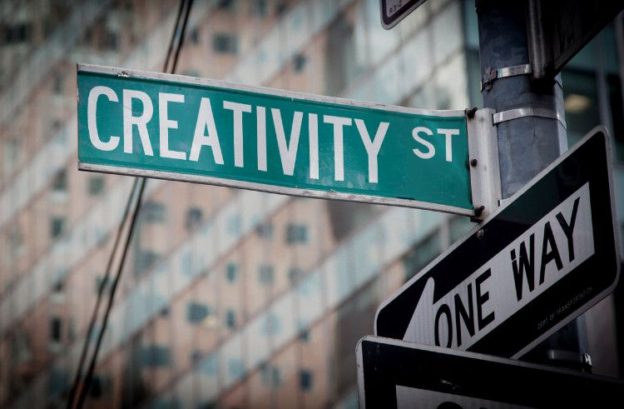Creativity is something that lots of us admire. It’s also subtly supressed by our education system – the need to conform and get immediate results squashes our creativity temporarily or forever.
I’ll admit that there are some jobs where creativity would be a problem – rocket scientists, surgeons, even fast food cooks. But even that doesn’t mean we can’t be more creative outside working hours.
Here are some ways to help you get your creative juices flowing again without getting too much brain ache in the process:
Allow yourself to day dream
Dreaming at night is a natural process, even though most of us don’t remember our dreams most of the time.
But it’s also natural to dream during the day.
If you’ve ever set out on a journey and don’t quite remember what happened between starting the journey and getting to your destination, you’ve day dreamed. Even if it wasn’t intentional.
Einstein used to day dream and some of his greatest moments came as a result of his focus on dreaming. Other giants in our world have done something similar.
Taking a power nap can help you to focus and re-invigorate you. Like night time dreams, you may not consciously remember what happens in your dreams whilst you’re taking a power nap.
 In fact, trying too hard to remember your dreams can be counter-productive. It’s much better to go with the flow and just accept that the ideas that crop up in your day dreams will present themselves to you at the right time.
In fact, trying too hard to remember your dreams can be counter-productive. It’s much better to go with the flow and just accept that the ideas that crop up in your day dreams will present themselves to you at the right time.
I like to set the intention that will happen – just saying an affirmation such as “I allow my day dreams to make themselves known to me when it’s the best time for that to happen” makes all the difference. Good ideas pop into my mind seemingly out of the blue.
Put it in writing
There’s something extra that happens when you write things down, even if your handwriting would compete with a spider’s for legibility.
The seemingly simple act of putting pen to paper rather than tapping away at a keyboard and putting electrons somewhere basically unknown (ever looked at a CD or a disk and wondered how on earth the information you retrieve is stored?) takes it to another level.
Maybe it’s something going back to our roots when our ancestors painted on the walls of caves but, in reality, I’m personally not much concerned with why it works and much more concerned that it does work.
Maybe it’s because the sheet of paper physically exists whereas those elusive electrons are forever changing.
But I do know that putting things in writing works nicely.
And, if it’s appropriate, signing the sheet of paper works even better.
Whether that’s getting the creative juices flowing or putting something out to the universe.
Change your perspective
 If you’ve ever looked at a photo that’s been deliberately taken at an unusual angle, you’ll know that it can take time for your mind to adjust.
If you’ve ever looked at a photo that’s been deliberately taken at an unusual angle, you’ll know that it can take time for your mind to adjust.
That could be as simple as noticing things on one of your regular routes – look up or to the side more often. Set the intention that you’ll notice something that you’ll wonder how you’ve missed it on all those previous journeys.
Or just deliberately change the meaning of a word in a sentence. That’s easy – shops often have a menswear department but if you add in a couple of capital letters the meaning changes totally (try the M and the S if you’re not sure).
Children do this all the time because they “don’t know any better” but there’s nothing to say that just because we’ve become older and supposedly wiser we can’t change our perspective.
Keep asking “why”
This is a fantastic if sometimes annoying way to boost your creativity.
When you come across something that you’d like to practice your creativity on, define whatever it is (however precisely or vaguely you want to do that) and then ask “why”.
Make sure you come up with an answer then ask “why” again and then answer that. And so on until you really can’t come up with another answer.
I usually find that the first two or three iterations are relatively easy. Then the fourth, fifth and sixth are a bit of a struggle. Then seven, eight, nine and maybe even ten flow.
It varies by question plus quite a few other factors.
But it’s always a stretch to come up with new things and, in turn, that helps creativity more than you initially imagine.
Do something new
With the wealth of things available on the web, this is incredibly easy.
You can use Google’s “I’m feeling lucky” button to transport you somewhere new.
You can follow the suggestions in Amazon – I’ve done that to find new music to listen to (I also do searches on Wikipedia for favourite artists or producers) or you could follow suggestions on any other site you use regularly.
You could go outdoors more often – do a regular route backwards or toss a coin to decide whether to turn left or right at junctions.
Talk to people – that’s almost a lost art now that people are almost constantly nose deep into their phones.
Choose somewhere new to go this weekend – chances are there are lots of places locally that you’ve never visited because they’re too close and not “special” enough.
Have fun
When was the last time you had fun?
Today? This week? This month? This year? So long ago you can’t really remember?
Whichever answer you gave, set out to have fun more often.
For no other reason than it’s fun to have fun!
Whether you’re an adrenaline junkie or whatever else gives you the feeling of having fun, just do it.
Allow yourself to enjoy things!
And if you still need help, click here to change your mind so that your creativity gets taken to a new (higher) level.








